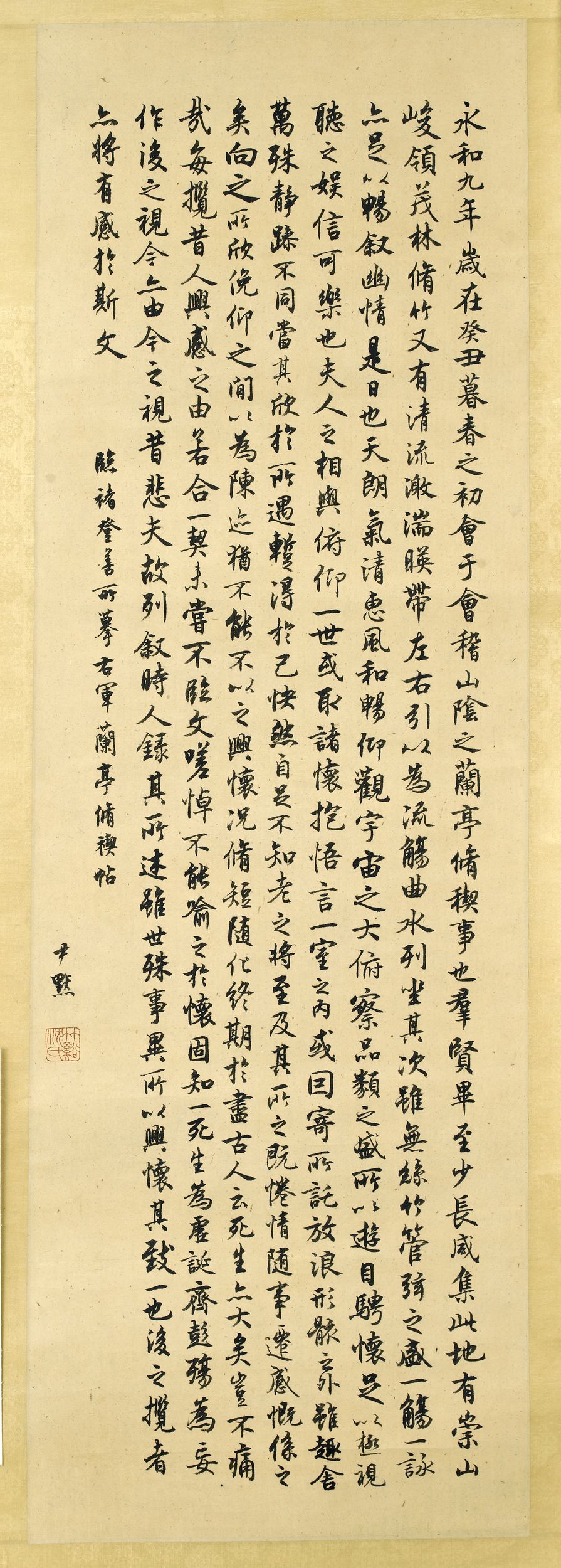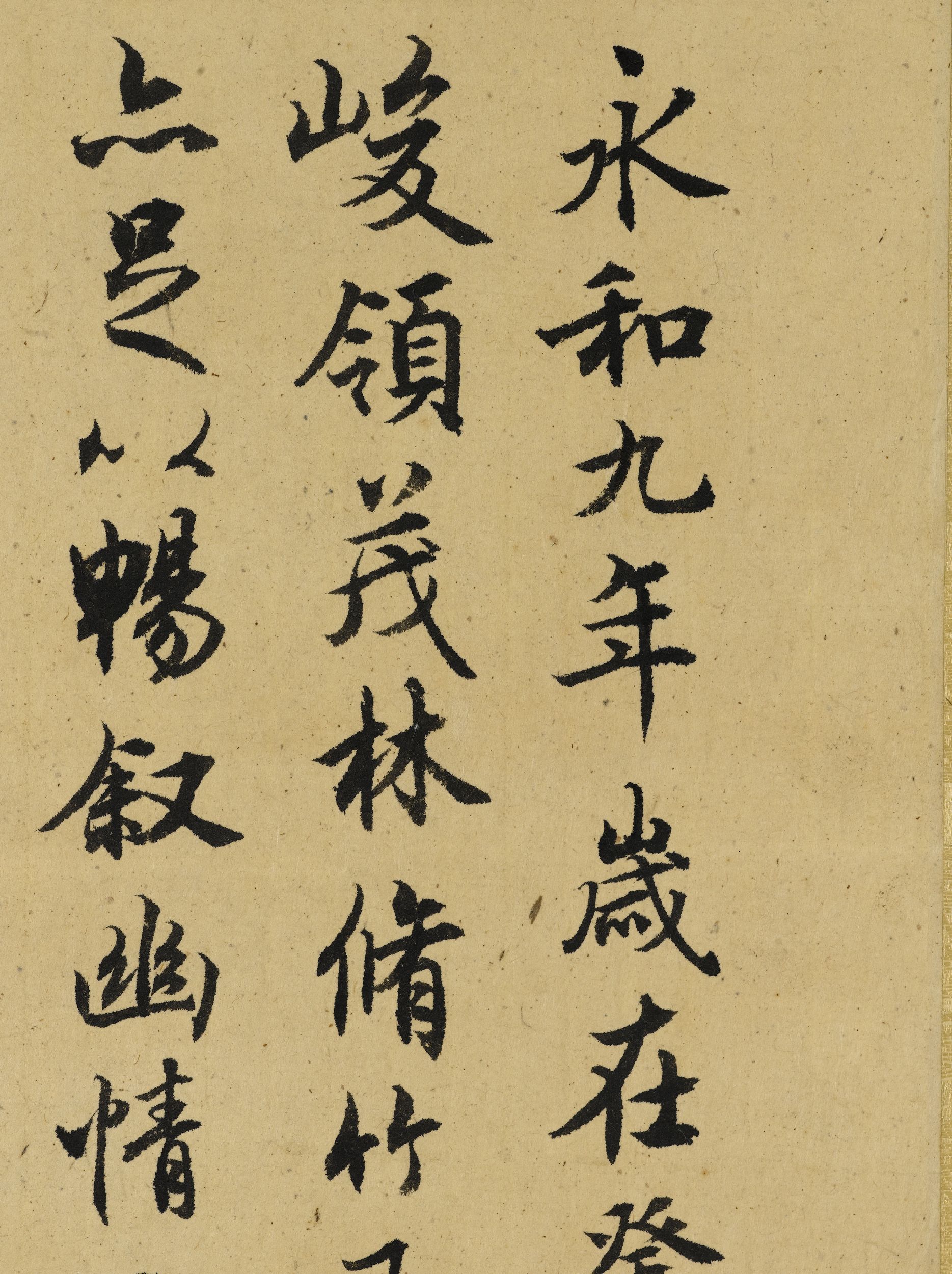
Préface au Pavillon des Orchidées
Papier, Encre
Calligraphie
尹默; 竹谿沈氏
Don manuel : Guo, Youshou 郭有守, Docteur
M.C. 8657
Inscription:
In the ninth year [353] of the Yonghe [Everlasting Harmony] reign, which was a guichou year, early in the final month of spring, we gathered at Orchid Pavilion in Shanyin in Guiji for the ceremony of purification.
Young and old congregated, and there was a throng of men of distinction. Surrounding the pavilion were high hills with lofty peaks, luxuriant woods and tall bamboos. There was, moreover, a swirling, splashing stream, wonderfully clear, which curved round it like a ribbon, so that we seated ourselves along it in a drinking game, in which cups of wine were set afloat and drifted to those who sat downstream. The occasion was not heightened by the presence of musicians. Nevertheless, what with drinking and the composing of verses, we conversed in whole-hearted freedom, entering fully into one another's feelings. The day was fine, the air clear, and a gentle breeze regaled us, so that on looking up we responded to the vastness of the universe, and on bending down were struck by the manifold riches of the earth. And as our eyes wandered from object to object, so out hearts, too, rambled with them. Indeed, for the eye as well as the ear, it was pure delight! What perfect bliss!
For in men's associations with one another in their journey through life, some draw upon their inner resources and find satisfaction in a closeted conversation with a friend, but others, led by their inclinations, abandon themselves without constraint to diverse interests and pursuits, oblivious of their physical existence. Their choice may be infinitely varied even as their temperament will range from the serene to the irascible. Yet, when absorbed by what they are engaged in, they are for the moment pleased with themselves and, in their self-satisfaction, forget that old age is at hand. But when eventually they tire of what had so engrossed them, their feelings will have altered with their circumstances; and, of a sudden, complacency gives way to regret. What previously had gratified them is now a thing of the past, which itself is cause for lament. Besides, although the span of men's lives may be longer or shorter, all must end in death. And, as has been said by the ancients, birth and death are momentous events. What an agonizing thought! In reading the compositions of earlier men, I have tried to trace the causes of their melancholy, which too often are the same as those that affect myself. And I have then confronted the book with a deep sigh, without, however, being able to reconcile myself to it all. But this much I do know: it is idle to pretend that life and death are equal states, and foolish to claim that a youth cut off in his prime has led the protracted life of a centenarian. For men of a later age will look upon our time as we look upon earlier ages—a chastening reflection.
And so I have listed those present on this occasion and transcribed their verses. Even when circumstances have changed and men inhabit a different world, it will still be the same causes that induce the mood of melancholy attendant on poetical composition. Perhaps some reader of the future will be moved by the sentiments expressed in this preface.
[Trans. H.C. Chang, Chinese Literature, Vol. 2: Nature Poetry, Edinburgh: Edinburgh University Press, 1977, pp. 8-9]
After the copy made by Chu Dengshan [Chu Suiliang] of the Preface to the Poems Composed at the Orchid Pavilion (Lanting Xu) by You jun [Wang Xizhi].
Shen Yinmo was born in a town today known as Ankang, in Shaanxi province, into a family from Huzhou, Zhejian province. Like many intellectuals of his generation, he completed his training with two years of study in Japan, from 1903 to 1906. His meeting with Chen Duxiu (1880-1942) was decisive in his political orientation. Shen Yinmo, who taught literature at the Beijing University, began to work with the New Youth magazine founded by Chen Duxiu. By the time he settled in Shanghai in 1932, his reputation as a calligrapher was well established. During the war, he took refuge in Chongqing. After 1949, Shen Yinmo held important positions in the cultural administration under Chen Yi (1901-1972), mayor of Shanghai at the time.
Shen Yinmo’s version of the Preface to the Poems Composed at the Orchid Pavilion (Lanting Xu) by Wang Xizhi is highly representative of his work. For almost a century, the study of steles had had a considerable influence on calligraphic artistry. In the early 20th century, the influential calligrapher and theorist Kang Youwei was still playing an active role in this trend. In this context, Shen Yinmo’s return to the tradition of Wang Xizhi constituted a rupture. By drawing not only on Wang Xizhi but also on the Tang calligraphers, such as Chu Suiliang (596-658), and Song calligraphers such as Huang Tingjian and Mi Fu, Shen Yinmo was rehabilitating a form of classicism.
